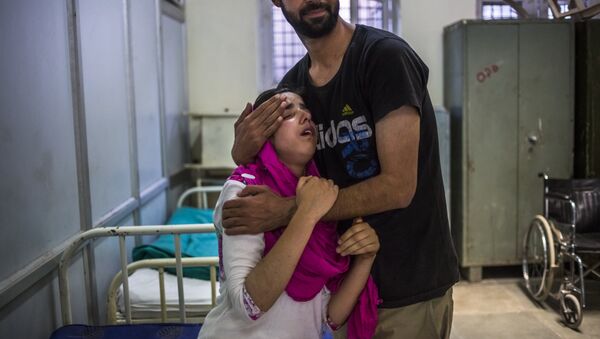New Delhi (Sputnik) – Nearly two hundred thousand Indians take their own lives each year and if data for attempted suicide is included the number goes up substantially. What’s worrying, more than 90 percent of those cases do not receive adequate medical care.
21st World Congress of mental health https://t.co/twMNJepFYp pic.twitter.com/TMbxGVmc5V
— UCC India (@UCC_India) 2 ноября 2017 г.
The startling revelation was made by Indian President Ram Nath Kovind while inaugurating the 21st World Congress of Mental Health in Delhi.
"Our National Mental Health Survey, 2016 found that close to 14 percent of India's population required active mental health interventions. About two percent suffered from severe mental disorders," Kovind said.
National Mental Health Survey 2016 found that 14% of India’s population required active mental health interventions #PresidentKovind
— President of India (@rashtrapatibhvn) 2 ноября 2017 г.
The Indian president also noted that "the country has one of the highest prevalence of mental illnesses globally. It is also a fact that those living in metropolitan cities and those who were young whether in the productive age group or children and teenagers are most vulnerable to mental illnesses," he said.
READ MORE: Mental Health at Work: 'Extremely Important' UK Report 'Brings Visibility'
Both these factors are a major cause of concern since 65 percent of India's population is below the age of 35. The society is rapidly urbanizing, leaving India staring at a possible mental health epidemic. Social stigma associated with disclosing mental illnesses and underdeveloped facilities further create massive challenges.
"We need to talk about mental health issues and treat ailments such as depression and stress as diseases that can be cured – not as guilty secrets that must be pushed under the carpet," the President of India opined.
#PresidentKovind inaugurates 21st World Congress of Mental Health in New Delhi; says society has to fight the stigma around mental health pic.twitter.com/CIc81WBdYe
— President of India (@rashtrapatibhvn) 2 ноября 2017 г.
A major gap in combating the mental health challenge is that of human resources. India is a country with 1.25 billion people but just 700,000 doctors – less than one million. In the field of mental health, the scarcity is even acuter. There are only about 5,000 psychiatrists and less than 2,000 clinical psychologists in our country.
Psychiatrists agree that social stigma is the biggest challenge in treating mentally ill patients.
National Mental Health Programme is building 22 centres of excellence in the field of mental health #PresidentKovind
— President of India (@rashtrapatibhvn) 2 ноября 2017 г.
"The general approach in Indian families is to hide or understate mental illness or even attribute it to supernatural causes. And mind you, we are talking about the impact of this stigma on multiple aspects of life from social engagement to marriage, impact on kids and so on. From a family’s perspective, it is not easy to own it,” R.K. Burman, a psychiatrist from Delhi told Sputnik.
The 21st World Congress of Mental Health held in New Delhi was attended by over a thousand delegates including 300 from across the world.


